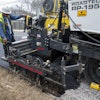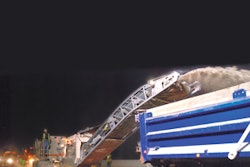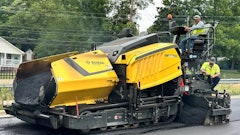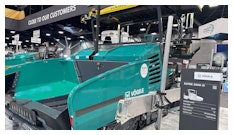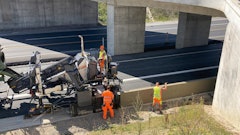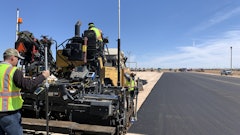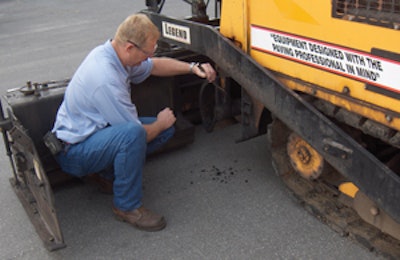
For many contractors, the end of the year means the end of another paving season. And although the off-season varies depending on what part of the country you are in, the maintenance that needs to be done during this downtime is applicable to all contractors. End-of-season maintenance is essential to ensure your paver will work properly and efficiently at the beginning of the next paving season.
"Downtime for repair in the paving season is too costly," says Mark Bolick, service manager for LeeBoy. "Time and money spent in the off-season is preventative maintenance and a wise investment in your business." It does not matter what point during the off-season you do your maintenance, but the bottom line is it needs to be done. Contractors who are unsure of what to do should follow the recommended maintenance procedures in the unit's operator manual, Bolick says.
"Winter maintenance is above and beyond all general lubrication and maintenance," says John Hood, sales manager for Bomag Americas. "You can lube and change filters anytime, but that's more of general maintenance." Off-season maintenance is much more thorough and detailed than routine maintenance done during the paving season. Bolick suggests a thorough cleaning of the paver be the first step in preparing for the off-season. Steve Kirst, product manager-pavers for the Gehl Company, agrees. He says all asphalt build-up should be removed before any maintenance is done. The next step is to perform an all-around servicing of the unit.
Hood recommends that contractors start from the ground up. He says to inspect the undercarriage for problems like loose pads. Next, look for holes in the conveyor. After a thorough look at the conveyor bed Hood says to look at the tractor assembly and finally your screed assembly. Although he says contractors don't typically need to inspect the screed assembly every year, all bearings and wear surfaces should be checked during the off-season.
In fact, Hood says the overall wear surfaces of a paver are the biggest things a contractor needs to pay attention to. "You want to make sure all of your wear surfaces are cleaned and prepped and ready to go, and replaced if need be," he says. The downtime of the off-season is the best time to do more in-depth maintenance because you are not losing any time on jobs. He also says this is the best time to replace bent components or give your paver a new coat of paint.
Brodie Hutchins, general manager of Vogele America, says that during the off-season contractors not only need to do maintenance, they also need to perform any service the paver may need. "Maintenance is the predictable things that manufacturers tell them to do at fixed intervals," Hutchins says. "Service is what you do when the machine is down for sometime." So contractors should not only do thorough inspections and maintenance, but they should also be making the necessary repairs.
What contractors need to replace varies on the use they have gotten out of their machines and how much work they plan on doing next paving season, Hutchins says. And replacement doesn't necessarily need to be done every off-season. "They [contractors] look at the condition parts are in now and then the work that they'll need for the following year, and most times they just replace wear parts if there is not enough life in them to get them through the next season," Hutchins says. However, if the material a contractor uses is really abrasive or if the paver will be paving a lot in the next season, replacing parts such as floor or screed plates is necessary.
The off-season is planned downtime when contractors can do the proper maintenance to ensure their pavers run well and avoid too much unplanned downtime during the next season. Even though contractors have more time during the off-season, some basic maintenance issues often get missed. According to Hood, fan belts, radiator fluid, and hydraulic oil often get overlooked. All of these need to be changed to keep the paver running efficiently. Neglecting to change radiator fluid can result in the fluid's loss of anti-corrosion properties. Old hydraulic oil loses anti-corrosion and anti-foaming abilities which can result in reduced life for hydraulic components.
Bolick says contractors should not forget to drain and refill the planetary or gear box as recommended in the operator's manual as well. He says to cover moving parts such as cable ends, conveyor chains, auger chains, and extension slides with grease to protect them from moisture damage. Also, Kirst suggests lubricating bare metal surfaces to protect them from rust. Keeping the hydraulic cylinders in the fully retracted position protects cylinder rods from rusting. "This is also a good time to check the safety aspect of the machine," Kirst adds. "Replace any worn or illegible safety decals and double-check the condition of all safety shields and guards."
When the off-season is near the end, Kirst says contractors should remove all protective lubricants on the screed and hopper and double-check all fluid levels. Burners or electric screed heat should be checked before beginning work again in the spring, Bolick adds.
One way to ensure all parts are checked and basic maintenance is done is to check the paver's manual, which comes with the paver. However, Hutchins says another good resource to have is a service manual. These manuals usually come separately, and contractors will have to spend a little extra money for them. But, he says, service manuals have very in-depth information, and they can be invaluable to contractors.
If a contractor still isn't sure what maintenance or service needs to be done, contacting a factory-trained technician may be the best option, Hutchins says. A factory-trained technician can do an inspection on the paver and provide a condition report. "They're the people who are on the machines constantly and are able to find things quicker than someone who may not look at a machine for repair purposes," he says. "An operator doesn't look at it [the paver] the same way a service technician looks at a machine." Hutchins says while an operator might become used to a rattle and think it is a normal sound, a technician can hear a rattle and be able to say what needs to be checked and repaired.
Some final touches in preparing a paver for the off-season include: filling the fuel tank to prevent condensation in it, coating cable connections with electrical gel, making sure the unit is properly greased, and unhooking battery cables, Bolick says. When the paver has been thoroughly inspected and all off-season maintenance and service have been performed contractors can put their pavers into storage. When it comes to the best place to store a paver an inside location is ideal because it protects the paver from weather conditions. Kirst says keeping a paver indoors also helps to prevent any "varmints from taking up residency inside the equipment." However, a paver can also be stored outside, Hutchins says.
All of the described maintenance and service are important to preparing a paver for the off-season and the next paving season. The result of improper or neglect of off-season maintenance is a paver that will not be in top condition and will fail or break down when next season rolls around. Plus, paver components will experience premature wear, Hutchins adds. "There's no way around it, these things are going to wear themselves out," he says. Hydraulic system problems, an uneven mat, and improper distribution of the mix are all possible setbacks that could occur. And when uptime is so important for paving contractors, proper maintenance and service is the only way to ensure the paver has more uptime than downtime, Hutchins adds.
"That paver has to work. It has to be one of your most important pieces of equipment," Hood says. "If you don't maintain it and service it - you go out there and just start paving - it will go down. And not only can it result in a lot of hard handwork, you could effectively lose the job." Spending that extra time and money on paver maintenance and service during the off-season can be the difference between a successful paving season and one that is plagued with paver problems and loss of profits.



